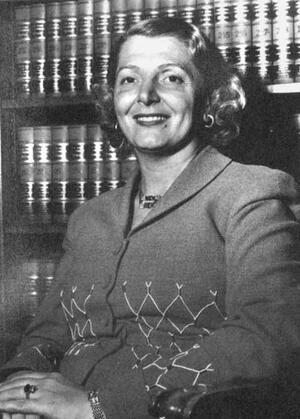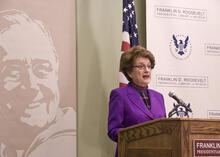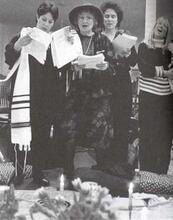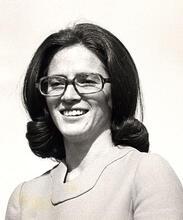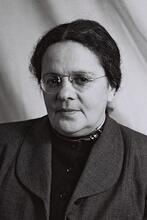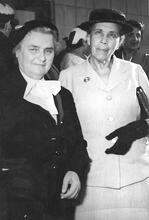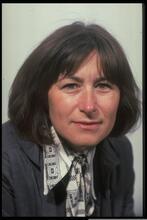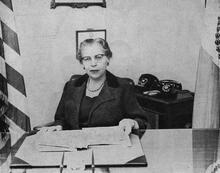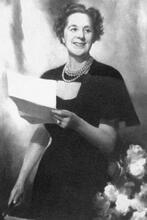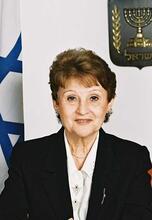Frieda Barkin Hennock
The first woman ever appointed to the Federal Communications Commission, Frieda Barkin Hennock argued that women had a disproportionate stake in the media and helped establish public broadcasting. Hennock’s parents wanted her to become a pianist and refused to pay for her law school education, so she worked as a clerk at various law firms during the day and took night classes at Brooklyn Law School, graduating in 1924. In 1948 President Truman appointed her to the FCC. During her time in office, she spearheaded efforts to reserve frequencies free from commercial interests for educational television, which became the foundation of PBS. She was appointed a federal district judge for New York in 1951 but withdrew after meeting widespread sexist opposition, continuing her term with the FCC.
Frieda Barkin Hennock was the first woman to serve on the Federal Communications Commission (FCC), where she became the champion of noncommercial educational television. As a Jewish female of foreign birth, she endured a lifetime of undeserved—largely sexist—attacks for everything from excessive aggressiveness to innuendoes of immoral personal conduct. At the same time, she did not hesitate to take advantage of her sparkling feminine charm, sense of high fashion, and occasional flood of tears to manipulate a male-dominated society. As a committed Jew, Hennock also used her contacts with the Jewish community for professional advancement. She said daily prayers and was fluent in Yiddish. She was a devoted and supportive member of her extended family.
Early Life and Career
Born in Kovel (formerly Russia and Poland), now Ukraine, on September 27, 1904, to Boris and Sarah (Barkin) Hennock, Frieda Hennock was the youngest of six girls and two boys. After immigrating to the United States in 1910, she became a United States citizen in 1916 when her father, a real estate broker and banker in New York City, was naturalized.
Before graduating from Morris High School in the Bronx, Hennock displayed promise as a pianist, and her parents wanted her to be a professional musician. When she insisted on becoming a lawyer, they refused to pay her law school tuition. Thereupon, she proceeded to work during the day as a clerk at several law firms to pay for her evening classes at the Brooklyn Law School. In 1924, at age nineteen, she graduated with an LL.B. but had to wait until she was twenty-one before being admitted to the New York bar. At twenty-two, Hennock was the youngest woman lawyer practicing in New York City.
Stating that, as a female lawyer, she “had to work twice as hard” to win a case, Hennock formed a partnership in 1927 with Julius Silver, a mentor of Edwin Land, founder of Polaroid Company. She won seven acquittals in celebrated murder trials in 1928 and 1929. The partnership dissolved in 1934 after litigation over disputed ownership of some Polaroid stock held by the firm.
In 1941, Frieda Hennock became the first woman and the first Democrat to join the prestigious law firm of Choate, Mitchell and Ely. At the same time, she was a prominent fund-raiser in support of President Franklin D. Roosevelt, Mayor William O’Dwyer, liberal Democrat causes, and women’s rights.
Politics and Legacy
President Harry S. Truman named Hennock to the FCC in 1948. During the confirmation hearing, in the Republican-controlled Senate, she gained the support of powerful Republicans including Senator Robert A. Taft and Owen Brewster. After Hennock was sworn in as the first woman commissioner on July 6, she stated that “it seems fundamental that in this field, so peculiarly affecting women, the viewpoint of their sex should be presented.” While in office, Hennock emerged as the major spokesperson for the fledgling educational television movement, pressing for permanent reservation of frequencies for this purpose, in opposition to her fellow commissioners and the commercial broadcasting industry lobby.
In 1951, Hennock was appointed a federal district judge in New York. But owing to sexist accusations of incompetence and personal misconduct, she withdrew. This humiliation turned out to be a great blessing in disguise, because as a result of it, she served out her FCC term. In recognition of her efforts, Hennock was invited to inaugurate the first educational television station, KUHT, Houston, Texas, in 1953. She also became noted for her landmark dissenting opinions against the powerful telecommunications special interests, thus influencing the shape of every aspect of television in its formative years.
In 1955, at the end of her term on the FCC, she was disappointed when President Dwight D. Eisenhower failed to reappoint her to the slot requiring a Democrat. Thereafter she returned to the practice of law, first as a partner at Davies, Richberg, Tydings, Beebe and Landa, and then on her own. She also acquired a commercial television station in Arkansas. In 1956, she married William H. Simons, a prosperous Washington realtor.
During her short but brilliant public career, Frieda Hennock became noted as the liberal gadfly on the FCC. Her style was confrontational, often abrasive. Her greatest triumph was the establishment of educational—now known as public—television. Fundamentally an idealist, she held that “television channels represent one of America’s most valuable resources” to be preserved in the public interest. On June 20, 1960, at age fifty-five, Frieda Barkin Hennock succumbed to a brain tumor.
AJYB 62:450.
Current Biography (1948).
Hennock, Frieda. Papers. Harry S. Truman Library, Independence, Mo., and Frieda Hennock Collection. Schlesinger Library, Radcliffe College, Cambridge, Mass..
Morgenthau, Henry. “Dona Quixote: The Adventures of Frieda Hennock.” Television Quarterly 26, no. 2 (1992).
NAW modern.
Obituary. NYTimes, June 21, 1960, 33:4.
Neustadt, Stanley, and Arthur Stambler, and Nicholas Zapple. Interviews with author.

